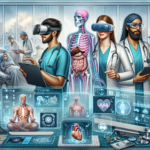Unlocking Safety and Efficiency: The Transformative Power of Simulation-Based Operator Training
What is Simulation-Based Operator Training?
In today’s high-risk industries, simulation-based operator training has become a cornerstone for enhancing both safety and productivity. This innovative training approach is particularly invaluable in sectors where the stakes are high and the costs are considerable. By employing advanced simulation technologies, organizations are able to significantly reduce risks, minimize costs associated with unscheduled maintenance, enhance trainer effectiveness, and ultimately maximize productivity. 🚀
Why is Simulation Training Essential in the Mining Industry?
The mining industry, known for its inherent risks and operational challenges, is rapidly embracing simulation training as a means to increase site safety and profitability. The benefits of this training method can be seen in several key areas:
- Enhanced Operator Skills: Simulators provide a platform for operators to learn and practice essential skills, inculcating a deeper understanding of machinery.
- Safety Improvements: Operators can learn in a safe environment, preparing for emergency situations that would be too dangerous or costly to replicate in real life.
- Cost-Efficiency: The ability to practice skills in a virtual space reduces the wear and tear on actual equipment, contributing to lower operational costs.
The Advantages of Using Simulators
Focusing on improving operator technique through simulation can yield proven results, such as:
- Longer Tire Life: Operators trained in simulation learn to maneuver equipment more expertly, extending the lifespan of tires.
- Reduced Spot Time: Enhanced operator efficiency leads to quicker turnaround times on any given task.
- Less Brake Abuse: Improved driving techniques mean less wear on braking systems, lowering maintenance needs.
- Fuel Efficiency: Training simulates ideal operating conditions, leading to better fuel consumption.
- Reduction in Engine Overspeeds: Operators become adept at maintaining optimal machine speeds, preventing costly damage.
Pre-Production Training Benefits
By enabling operators to practice their skills before they are placed into production, simulation-based training leads to:
- Confidence Building: Operators feel more prepared when they face real equipment.
- Deeper Knowledge: A better grasp of how machines function enhances overall operational safety.
- Mindful Decision-Making: Operators trained in simulations are more capable of making informed decisions in high-pressure situations.
Immersive Technologies: Leading the Way
One of the key players in this field is Immersive Technologies, known for providing cutting-edge mining equipment simulators. They have established a reputation for:
- Comprehensive Solutions: Delivering complete training packages that yield measurable safety and business improvements.
- Industry Collaboration: Working closely with mining managers and professionals, Immersive Technologies tailors solutions that improve both safety and profitability.
Exploring VR in Emergency Response Training
As industries evolve, so do the methods used to train employees, particularly in emergency response. Traditional training methods like classroom sessions and mock drills are being complemented—and in some cases, replaced—by Virtual Reality (VR) technology, which offers several distinct advantages:
- Realism: VR provides an immersive training environment where healthcare professionals can practice emergency response tasks without any risk.
- Cost-Effectiveness: These solutions reduce the need for expensive props and equipment, streamlining the training budget.
- Engagement: The immersive aspects of VR increase engagement among trainees, making learning more enjoyable and effective.
- Immediate Feedback: Trainees receive instant evaluations that help them understand their strengths and areas for improvement.
- Consistency: VR can deliver a uniform training experience, ensuring every trainee receives the same foundational knowledge.
Practical Applications of VR in Training
VR technology can simulate real-world scenarios, proving particularly useful in training for:
- Firefighting: Trainees can practice extinguishing fires in controlled virtual environments, honing their skills without real danger.
- Medical Emergencies: Healthcare professionals can refine their response techniques under high-pressure situations.
- Natural Disaster Response: Emergency responders learn coordination and decision-making during various disasters.
- Law Enforcement: Tactical training scenarios prepare officers for unexpected situations while dealing with the public.
The Future of VR Technology in Emergency Response Training
As VR technologies continue to evolve, future trends integrating AI could further enhance the training landscape. Potential advancements include:
- Enhanced Interactivity: Real-time responsiveness in simulations ensures that trainees face dynamic challenges similar to what they would experience during an actual emergency.
- Desktop VR Solutions: Emerging affordable desktop VR options allow broader access to training, making high-quality education more available to organizations with varying budgets.
MedVR Education: Pioneering VR Training Solutions
Platforms like MedVR Education are at the forefront of implementing modern VR training solutions specifically designed for healthcare professionals. Their approach includes:
- Immersive Learning: Offering engaging VR training experiences that foster effective learning and preparedness.
- Cutting-Edge Technology: Utilizing the latest in VR to ensure trainees receive an education that reflects current practices.
By embracing the transformative capabilities of simulation-based training—whether in operator settings like mining or emergency response scenarios—organizations can enhance their operational efficiency and safety, ultimately contributing to a more secure working environment. The future of training lies in the seamless integration of technology and innovative methodologies, charting a new course for success across industries. 🌟




0 Comments